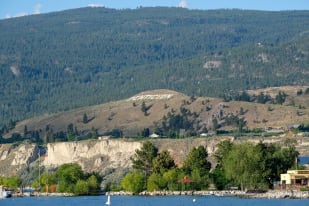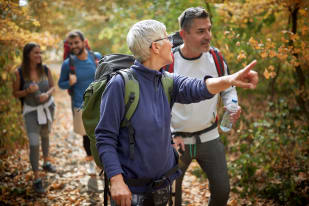Hiking in Penticton offers a perfect way to enjoy the region's natural beauty, but staying safe while exploring the trails is essential. This piece provides crucial safety tips, including necessary gear, trail etiquette, and preparing for different weather conditions.
Essential Gear for Hiking
Footwear and Clothing
The foundation of a safe hike starts with proper footwear. Sturdy hiking boots with good ankle support and traction are crucial for navigating rocky and uneven terrain. Look for waterproof and breathable boots to keep your feet dry and comfortable.
Layered clothing is another critical component. Start with a moisture-wicking base layer to keep sweat away from your skin, add an insulating mid-layer for warmth, and finish with a waterproof outer layer to protect against wind and rain. Wear a hat and gloves for cooler days, and pack extra layers if the weather changes.
Navigation Tools
Even if you're familiar with the trail, always carry a map, compass, or GPS device. Trail maps can be downloaded from local tourism websites or purchased at visitor centres. Apps like AllTrails provide additional navigation support, but offline maps are essential in areas with poor signal.
Before you set out, familiarize yourself with the trail's layout and key landmarks. Knowing how to use your navigation tools is critical; take the time to learn basic map-reading and compass skills.
Hydration and Nutrition
Proper hydration is vital for a successful hike. Carry at least 2 litres of water for a day hike, and consider a hydration system like a CamelBak for convenience. Bring a portable water filter or purification tablets to refill from natural sources on longer hikes.
Pack high-energy snacks such as nuts, dried fruit, and energy bars to maintain energy levels. Store food securely to avoid attracting wildlife, and always bring more than you think you'll need in case of delays.
Safety Equipment
A well-stocked first-aid kit should be a staple in your hiking gear. Include bandages, antiseptic wipes, blister treatment, and any personal medications. A whistle can help you signal for help if needed, and a multi-tool can be helpful for various tasks, from cutting food to repairing gear.
Remember a flashlight or headlamp, even on day hikes, if you get delayed and find yourself hiking in low light. For longer or remote hikes, consider carrying emergency shelter and fire-starting materials.
Trail Etiquette
Respecting the Trail
Stay on marked trails to protect the environment and avoid getting lost. This helps preserve the natural habitat and prevents erosion. Avoid shortcuts, and respect trail closures and signs.
Practice Leave No Trace principles by packing out all trash and minimizing your impact on natural areas. Carry a small bag for your rubbish and any litter you find along the way, and dispose of it properly.
Respecting Other Hikers
Good trail etiquette ensures a pleasant experience for everyone. Yield to uphill hikers and step aside to allow them to pass. Keep noise levels down to maintain the tranquillity of the natural surroundings.
If hiking with pets, keep them on a leash and clean up afterward. Be mindful of other hikers who may not be comfortable around animals.
Wildlife Encounters
Seeing wildlife can be a highlight of any hike, but observing animals safely and responsibly is essential. Make noise to avoid surprising larger animals, and keep a safe distance if you encounter them. Do not feed wildlife, as human food can harm them and lead to dangerous behaviour.
If you encounter a bear or coyote, remain calm and back away slowly. Make yourself look more extensive, and never run. Carry bear spray in areas where bears are common, and know how to use it.
Preparing for Different Weather Conditions
Hot Weather Hiking
Hiking in hot weather requires special precautions. Start early or hike in the late afternoon to avoid the day's heat. Wear light, breathable clothing and use sunscreen to protect your skin. Stay hydrated by drinking water regularly and taking breaks in the shade.
Be aware of the signs of heat exhaustion, such as dizziness, nausea, and excessive sweating. If you experience these symptoms, rest in a cool place and hydrate immediately.
Cold Weather Hiking
Layering is vital for cold-weather hiking. Start with a moisture-wicking base layer to keep sweat off your skin, add insulating layers for warmth, and top it with a waterproof and windproof outer layer. Hats, gloves, and warm socks are essential to prevent heat loss.
Stay dry by avoiding cotton clothing, which retains moisture. Recognize the signs of hypothermia and frostbite and know how to treat them. Keep moving to generate body heat, but avoid sweating, making you cold.
Rainy and Wet Conditions
Hiking in wet conditions can be challenging, but with the right gear, it's manageable. Wear waterproof clothing and pack a rain cover for your backpack. Use trekking poles for stability on slippery terrain, and watch your step to avoid muddy areas that can lead to falls.
Keep your electronics and other valuables dry by packing them in waterproof bags or containers. Be prepared for weather changes and have a plan for seeking shelter if needed.
Storm Preparedness
Storms can develop quickly, so it's essential to be prepared. Recognize signs of approaching storms, such as increasing wind and darkening clouds. Avoid exposed areas during lightning storms and seek shelter in a low, protected area if caught in a storm.
Communicate your hiking plan with someone before you set out, and check the weather forecast. If a storm is predicted, it might be best to reschedule your hike for another day.
Conclusion
Hiking in Penticton is a beautiful way to experience the region's natural beauty, but safety should always be your top priority. You can enjoy a safe and rewarding hiking adventure with the right gear, proper preparation, and respect for the environment and other hikers.





